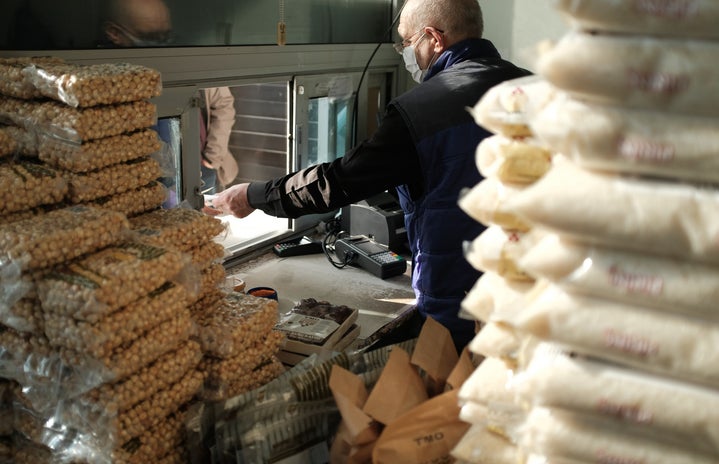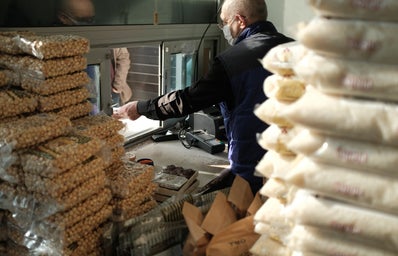There’s a thin similarity between our economy and the sanitary emergency we’re living in: Both seem to be deeply rooted with our social structure, as currently we see a mass dissolution of stores and a rising number of unemployment. The USP graduate in Economics Ligia Toneto talks about her time as a UN student and also about a different angle of the pandemic: The ones who prospered in this atypical and dry scenario.
P.S.: There’s a special glossary at the end of this article explaining some economic concepts that are present in the text. If for some reason you have a hard time understanding any of those, feel free to contact us.
HC: First of all, what can you tell about your career as an economist?
L: I graduated two years ago in Economics by the University of São Paulo. During my graduation period I attended the Academic Center and an extension project regarding the health sector called “Bandeira Científica”, about public policies analysis which impacts health. I also had an internship in a consulting company called “Tendencias”, where I worked with more specific sectors, like in oil, gas and electric energy. But nowadays I currently work at IREE’s Economic Study Center, an institute for relations between the state and companies when it comes to reforms. There I work making macroeconomics analysis and sectorial ones. I’m also taking my master’s degree right now at the University of Campinas (Unicamp).
HC: Unfortunately, the economics territory is still dominated by men. Do you have any advice to women who are interested in learning about economics, inside and outside the academic space?
L: I do think that economics is indeed a field controlled by men. It’s mostly a male bachelor course and as you rise academically it gets even more. I’m lucky because at Unicamp my class is mostly composed of women, but I know it gets worse. There’s also the lack of female professors, it’s hard and very discouraging.Their absence makes it a lot difficult for women to see themselves in an academic career and in the labor market it isn’t different, but maybe the Academy is even worse. I do see an attempt to open up the space for women in the public debate, but it’s still very sexist when it comes to the economic one.
In college, we did spaces for economic debates among women so they would feel more comfortable. Sometimes, in mixed places, women will only speak when they are 100% sure because it’s a very hostile and contaminated environment. So creating this is a way to strengthen ourselves up. Searching this composition in debate spaces is important for women who are entering the area to feel a bigger reference, because I do think that the difficulty of seeing oneself in their career makes it very hard.

HC: In 2020, the swiss bank UBS released a report regarding the billionaires’ wealth growth all over the world, reaching an unremarkable 27,5%. How do you analyze this wealth explosion in such an epidemic scenario where unemployment and the scarcity of financial resources are the main tendencies for the general population?
L: Gladly this is an issue that has been on the spotlight these days. We needed a billionaire’s wealth explosion to understand that inequity is a structural problem we face. Going back to the 80’s, a very flexible capital market policy based on its liberalization was implemented almost worldwide, next to the decrease of the government roll in the economy. That agenda intensified the flow of financial capital, making the presence of economic bubbles and financial crisis much more frequent. And it generates a huge pressure on inequity in Europe but mostly in Latin America. That same pressure is put on the capital flow and all these movements run through the financial market, creating speculative bubbles and enriching the small part of the population.
Who really earns money keeps on earning it, it doesn’t matter if the bubbles or the companies crash. These people already make too much profit from this specific capital flow as others don’t. And so, gigantic corporations like Amazon, Google and Apple are placed all over the world and do have various chief executives, but one single owner. And this single owner is the one who ‘s making money with action value and all of the speculative movement.
Therefore, with that degree of liberalization in the world, there’s also a deep income and now we have more people talking about it. With the pandemic we realized that, even if for some people it might seem that we don’t necessarily need the state in the economy, we need it to save lives. It can be by saving their lives or their jobs, and we must look at all the billionaires’ wealth data to advance on that.
HC: Which would be the economic sectors that profited the most from the Coronavirus pandemic? Is it right to say that the tertiary sector had an extraordinary growth?
L: Not absolutely. The service sector was the most harmed during the pandemic in Brazil, for example, in terms of data. Only in February 2021 it returned to his previous level before the shock. There’s also the Information Technology sector that grew a lot from the home office and delivery adaptations. And there’s more, for example, within the transportation sector – air transport has plummeted because airports have been closed or with flight restrictions, while waterway transportation had plenty of growth because the transportation of goods has increased to a great extent, and people started to buy a lot on the internet. Everything that you buy from China, for example, comes by water.
There’s a very big discrepancy and the problem is that, within the service sectors that have grown the most, on average, they are the least labor intensive. That’s why you have a very high unemployment in the service sector these days, almost 5 million people who have not yet recovered their jobs at the end of last year. Still, hypermarkets and supermarkets almost did not suffer, it even grew at some point, then it became more or less stable. Some industries were able to adapt their product, and the ones that failed to adapt ended up more affected.

HC: So if you would name two or three economic sectors that profited the most from the pandemic, which would they be?
L: I think the technology and information one, inside the tertiary sector. But the financial sector also had its profit, not necessarily because of the pandemic, but because it was able to adapt itself technologically, as the banks did. But neither services grew in 2020. Trade recovered faster, industry recovered soon after, and services recovered only now. However, if you fragment the tertiary, the sector of services in technology and information would be the one that has grown the most.
In the banking sector there was an expansion of credit through government policies. There was released a lot of credit for micro and small companies and it was intermediated by it, so what the Central Bank, the National Treasury or BNDES does is release a part of what it gets from funds for banks to be able to do that. The government made a credit line for individuals and to extend debt payments.
Consequently, with this flow of money, the banking sector grew and the credit card portion did too. Many people started using it and now we have PIX, which was created in the pandemic context. It is also a thing from the financial sector. In this way, the investment in technology grew, but in physical terms it decreased. Many bank branches closed in 2020 because lots of people started using apps and such.
HC: As an economist, can you predict if these sectors will remain stable after the coronavirus pandemic?
L: I think it depends. If I had to make a forecast I would say that the technology and information sector will continue to grow or at least remain still, since it had an irreversible degree of adaptation. And it was already growing, in general it was a sector that grew a lot with lots of innovation.
And from my point of view, the pharmaceutical sector will not change their trajectory. It might continue to grow regularly, as sectors grow, but I don’t think it will have this mismatch of the pandemic. Neither is the supermarket and hypermarket sector.
But from my standpoint, the rest has a tendency to destabilize. The problem is that whoever broke down in the pandemic, the commercial establishment and service companies that closed, may not reopen. And they also may close, for example, due to the end of credit programs. Since they are unable to pay the debts they had and after the pandemic, they might end up in more debt than when they started. For sectors to grow or survive, it depends on the economy itself growing and also on how much the government will commit to making income, credit policies on this emergency basis, and job recovery stimulation.
Special glossary of a few technical terms:
Capital Flow: “The movement of money for the purpose of investment, trade, or business operations” (definition from investopedia.com)
Macroeconomy: “The branch of economics that studies the behavior and performance of an economy as a whole. It focuses on the aggregate changes in the economy such as unemployment, growth rate, gross domestic product and inflation” (definition from economictimes.com)
Service sector: “Economic sector that, unlike agriculture and industry, produces no goods, but provides a service that satisfies a need” (definition from encyclopedia.com)
Central Bank: “Monetary institution which fully controls the production, circulation, and the supply of money in the market, seeking to regulate the member banks and stabilize a nation’s economy and national currency” (definition from myaccountingcourse.com)
National Treasury: “The Treasury is the executive agency of the federal government that manages national finances. It also advises the president on financial, trade, and tax policies” (definition from thebalance.com)
BNDES: Stands for Banco Nacional de Desenvolvimento Econômico e Social, one of the biggest development banks in the world. It’s the main tool used by the Brazilian federal government for long term investments (definition from BNDES.gov.br)
—————————————————————-
The article above was edited by Karen Oliveira.
Liked this type of content? Check Her Campus Casper Libero home page for more!


